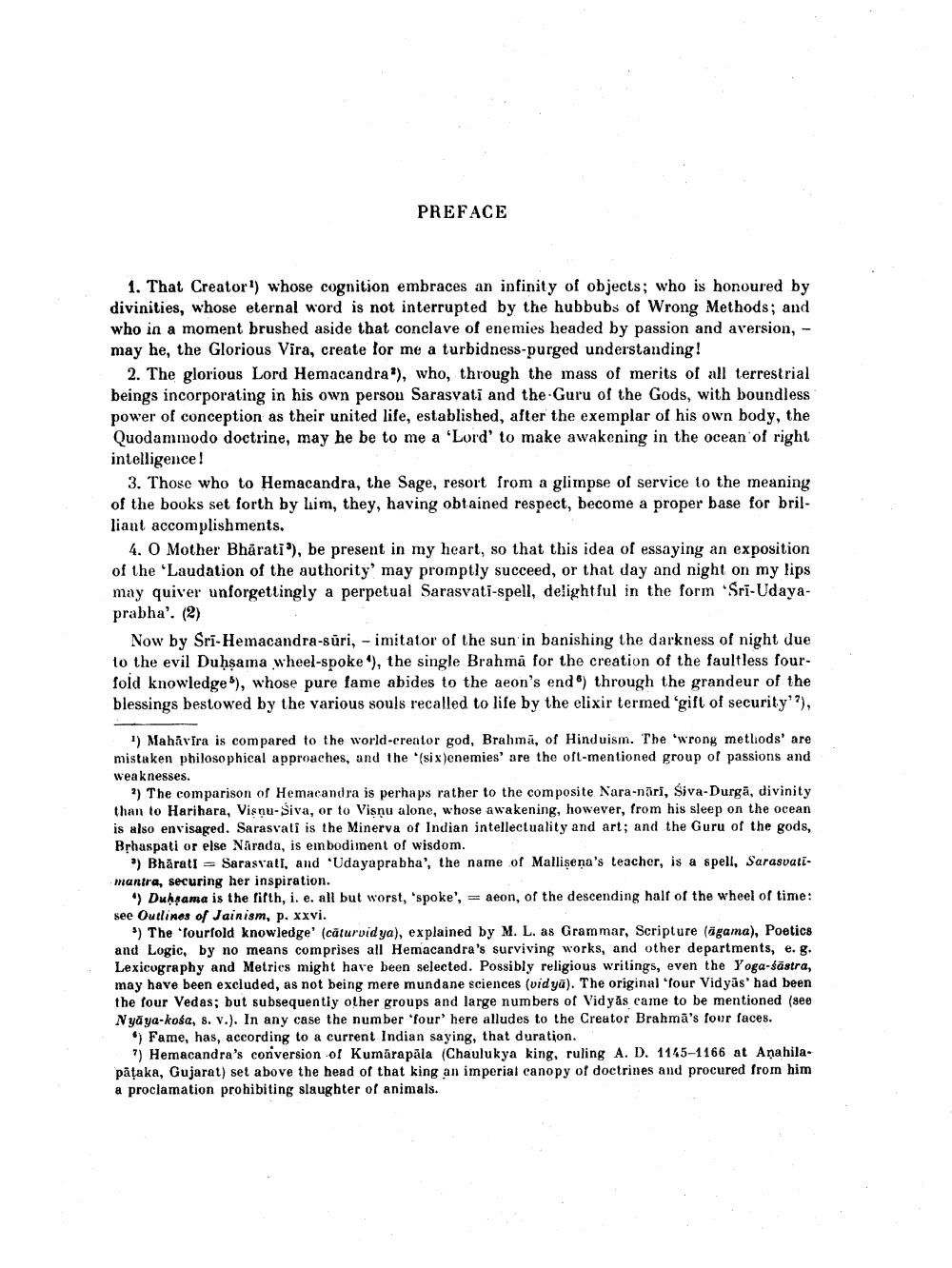________________
PREFACE
1. That Creator1) whose cognition embraces an infinity of objects; who is honoured by divinities, whose eternal word is not interrupted by the hubbubs of Wrong Methods; and who in a moment brushed aside that conclave of enemies headed by passion and aversion, - may he, the Glorious Vira, create for me a turbidness-purged understanding!
2. The glorious Lord Hemacandra3), who, through the mass of merits of all terrestrial beings incorporating in his own person Sarasvati and the Guru of the Gods, with boundless power of conception as their united life, established, after the exemplar of his own body, the Quodammodo doctrine, may he be to me a 'Lord' to make awakening in the ocean of right intelligence!
3. Those who to Hemacandra, the Sage, resort from a glimpse of service to the meaning of the books set forth by him, they, having obtained respect, become a proper base for brilliant accomplishments.
4. O Mother Bharati'), be present in my heart, so that this idea of essaying an exposition of the 'Laudation of the authority' may promptly succeed, or that day and night on my lips may quiver unforgettingly a perpetual Sarasvati-spell, delightful in the form 'Sri-Udayaprabha". (2)
Now by Sri-Hemacandra-sūri, - imitator of the sun in banishing the darkness of night due to the evil Duḥsama wheel-spoke), the single Brahma for the creation of the faultless fourfold knowledge), whose pure fame abides to the aeon's end) through the grandeur of the blessings bestowed by the various souls recalled to life by the elixir termed 'gift of security'?),
1) Mahavira is compared to the world-creator god, Brahma, of Hinduism. The 'wrong metliods' are mistaken philosophical approaches, and the (six)enemies' are the oft-mentioned group of passions and weaknesses.
2) The comparison of Hemacandra is perhaps rather to the composite Nara-nāri, Śiva-Durgā, divinity than to Harihara, Visnu-Siva, or to Visņu alone, whose awakening, however, from his sleep on the ocean is also envisaged. Sarasvati is the Minerva of Indian intellectuality and art; and the Guru of the gods, Bṛhaspati or else Närada, is embodiment of wisdom.
*) Bharati Sarasvati, and Udayaprabha', the name of Mallisena's teacher, is a spell, Sarasvatimantra, securing her inspiration.
"Duhgama is the fifth, i. e. all but worst, 'spoke', aeon, of the descending half of the wheel of time: see Outlines of Jainism, p. xxvi.
3) The fourfold knowledge' (caturvidya), explained by M. L. as Grammar, Scripture (agama), Poetics and Logic, by no means comprises all Hemacandra's surviving works, and other departments, e. g. Lexicography and Metrics might have been selected. Possibly religious writings, even the Yoga-sastra, may have been excluded, as not being mere mundane sciences (vidya). The original 'four Vidyas' had been the four Vedas; but subsequently other groups and large numbers of Vidyas came to be mentioned (see Nyaya-kosa, s. v.). In any case the number 'four' here alludes to the Creator Brahma's four faces.
Fame, has, according to a current Indian saying, that duration.
7) Hemacandra's conversion of Kumarapala (Chaulukya king, ruling A. D. 1145-1166 at Anahilapataka, Gujarat) set above the head of that king an imperial canopy of doctrines and procured from him a proclamation prohibiting slaughter of animals.




